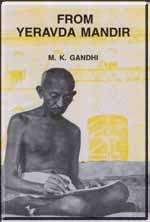
P.O. SEVAGRAM, DIST.WARDHA 442102, MS, INDIA. Phone: 91-7152-284753
FOUNDED BY MAHATMA GANDHI IN 1936
FROM YERAVDA MANDIR [Ashram Observances]
Translated from Gujarati by : Valji Govindji Desai

FROM YERAVDA MANDIR
[Ashram Observances]
Table of Contents
- To The Reader
- Preface
- Truth
- Ahimsa or Love
- Brahmacharya or Chastity
- Control of the Palate
- Non-stealing
- Non-possession or Poverty
- Fearlessness
- Removal of Untouchability
- Bread Labour
- Tolerance, i.e. Equality of Religions-I
- Tolerance, i.e. Equality of Religions-II
- Humility
- Importance of Vows
- Yajna or Sacrifice
- More About Yajna
- Swadeshi
About This Book
Written by : M. K. Gandhi
Translated from Gujarati by : Valji Govindji Desai
First Edition :1,08,000 copies 1932
ISBN : 81-7229-135-3
Printed and Published by : Jitendra T. Desai
Navajivan Mudranalaya,
Ahemadabad-380014
India
© Navajivan Trust, 1932
Download
Chapter 6: Non-possession or Poverty
Non-possession is allied to Non-stealing. A thing not originally stolen must nevertheless be classified as stolen property, if we possess it without needing it. Possession implies provision for the future. A seeker after Truth, a follower of the law of Love cannot hold anything against tomorrow. God never stores for the morrow; He never creates more than what is strictly needed for the moment. If therefore we repose faith in His providence, we should rest assured, that He will give us every day our daily bread, meaning everything that we require. Saints and devotees, who have lived in such faith, have always derived a justification for it from their experience. Our ignorance or negligence of the Divine Law, which gives to man from day to day his daily bread and no more, has given rise to inequalities with all the miseries attendant upon them. The rich have a superfluous store of things which they do not need, and which are therefore neglected and wasted; while millions are starved to death for want of sustenance. If each retained possession only of what he needed, no one would be in want, and all would live in contentment. As it is, the rich are discontented no less than the poor. The poor man would fain become a millionaire, and the millionaire a multi-millionaire. The rich should take the initiative in dispossession with a view to a universal diffusion of the spirit of contentment. If only they keep their own property within moderate limits, the starving will be easily fed, and will learn the lesson of contentment along with the rich. Perfect fulfilment of the ideal of Non-possession requires that man should, like the birds, have no roof over his head, no clothing and no stock of food for the morrow. He will indeed need his daily bread, but it will be God's business, and not his, to provide it. Only the fewest possible, if any at all, can reach this ideal.
We ordinary seekers may not be repelled by the seeming impossibility. But we must keep the ideal constantly in view, and in the light thereof, critically examine our possessions, and try to reduce them. Civilization, in the real sense of the term, consists not in the multiplication, but in the deliberate and voluntary reduction of wants. This alone promotes real happiness and contentment, and increase the capacity for service. Judging by this criterion, we find, that in the Ashram we possess many things, the necessity for which cannot be proved, and we thus tempt our neighbours to thieve.
From the standpoint of pure Truth, the body too is a possession. It has been truly said, that desire for enjoyment creates bodies for the soul. When this desire vanishes, there remains no further need for the body, and man is free from the vicious cycle of births and deaths. The soul is omni-present; why should she care to be confined within the cage-like body, or do evil and even kill for the sake of that cage? We thus arrive at the ideal of total renunciation, and learn to use the body for the purpose of service so long as it exists, so much so that service, and not bread, becomes with us the staff of life. We eat and drink, sleep and wake, for service alone. Such an attitude of mind brings us real happiness, and the beatific vision in the fulness of time. Let us all examine ourselves from this standpoint.
We should remember, that Non-possession is a principle applicable to thoughts, as well as to things. A man who fills his brain with useless knowledge violates that inestimable principle. Thoughts, which turn us away from God, or do not turn us towards Him, constitute impediments in our way. In this connection we may consider the definition of knowledge contained in the 13th chapter of the Gita. We are there told, that humility (amanitvam) etc, constitute knowledge, and all the rest is ignorance. If this is true, - and there is no doubt that it is true, much that we hug today as knowledge is ignorance pure and simple, and therefore only does us harm, instead of conferring any benefit. It makes the mind wander, and even reduces it to a vacuity, and discontent flourishes in endless ramifications of evil.
Needless to say, this is not a plea for inertia. Every moment of our life should be filled with mental or physical activity, but that activity should be sattvika, tending to Truth. One who has consecrated his life to service cannot be idle for a single moment. But we have to learn to distinguish between good activity and evil activity. This discernment goes naturally with a single-minded devotion to service.